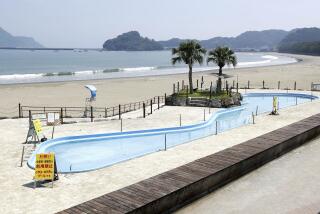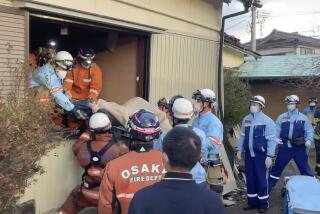Tokyo issues warning on tainted tap water
- Share via
Reporting from Tokyo and Ishinomaki, Japan — Parents in Tokyo and five surrounding cities scrambled for bottled water Thursday after the government warned that infants should not be allowed to consume tap water because elevated levels of radioactive iodine from a crippled nuclear plant were detected at a water treatment plant.
Water tests in Tokyo found levels of radioactive iodine-131 about double the level deemed safe for infants under the age of 1. The levels were below the unsafe benchmark for adults. In parts of Fukushima prefecture, where the nuclear plant is located, radiation levels exceeded both thresholds.
“This is a very conservative set of standards, which assumes very long-term consumption,” Japan’s chief Cabinet secretary, Yukio Edano, said Thursday.
Tokyo Gov. Shintaro Ishihara said the city’s water was safe for non-potable use and urged residents to remain calm. But some convenience stores were sold out of bottled water Thursday and officials planned to distribute bottled water to 80,000 households with young children. Calls soon flooded a hotline with questions about whether it was safe to breast-feed babies or take baths.
The water woes came a day after Japanese Prime Minister Naoto Kan expanded a shipment ban and urged consumers not to eat a dozen types of contaminated vegetables from the region surrounding the Fukushima Daiichi nuclear power plant 150 miles northeast of the capital.
The national government said damage from the March 11 earthquake, tsunami and nuclear accident could reach nearly $310 billion. The disaster could shrink Japan’s gross domestic product by 0.5% in fiscal 2011, which begins April 1, the government said.
Workers continued their struggle to gain control over the nuclear complex, where white vapor that appeared to be steam rose Thursday from three of the reactor buildings. Dark smoke at the No. 3 reactor that had forced officials to evacuate the facility a day earlier dissipated Thursday morning, and emergency workers were preparing to begin injecting as much as 500 tons of seawater into its spent-fuel pool, according to Japan’s Nuclear and Industrial Safety Agency. Temperatures in spent-fuel pools at all the reactors had fallen significantly, the agency reported Thursday.
As relief officials and displaced residents continued to battle subfreezing temperatures on the 13th day after the quake, the National Police Agency said Thursday morning that the death toll had increased to 9,523 and the number of missing to 16,067.
U.S. Ambassador John Roos and a contingent of U.S. military officials toured towns Wednesday along Japan’s battered northern coast. In Ishinomaki, he offered words of encouragement and further pledges of American support to a group of survivors who have taken shelter in an elementary school gymnasium.
“Nature can damage property and kill human life, but it cannot destroy the human spirit,” Roos told displaced residents at the Watanoha elementary school, which is serving as a temporary shelter. “Today, I have witnessed the very best of humanity.”
In Yamada city in Iwate prefecture, about 100 miles northeast of Sendai, UCLA pediatric critical care doctor Kozue Shimabukuro said mobility was improving after days in which residents were able to get around only by foot, thanks in part to Japanese Self-Defense Forces troops clearing massive amounts of debris. A gasoline shortage also has eased.
“A portable shower was set up today, so it was a good day,” said Shimabukuro, 34, a native of Okinawa, who is volunteering in the relief efforts.
The U.S. Food and Drug Administration on Tuesday banned the importation of milk, milk products and fresh fruits and vegetables from four areas near the Fukushima power plant, and Hong Kong announced a similar ban starting Thursday.
Minuscule particles of radioactive fallout from the plant have reached Iceland and are expected in France and elsewhere in Europe, experts said Wednesday, but they stressed that the amounts don’t pose a health risk, according to wire reports.
In Iceland, a plume carrying trace amounts of radioactive iodine has been detected, the country’s Radiation Safety Authority said. But the concentration, the agency added, was “less than a millionth” of what was found in European countries in the wake of the 1986 Chernobyl disaster that spewed radiation over a large distance.
Makinen reported from Tokyo, and Glionna reported from Ishinomaki.
More to Read
Sign up for Essential California
The most important California stories and recommendations in your inbox every morning.
You may occasionally receive promotional content from the Los Angeles Times.












